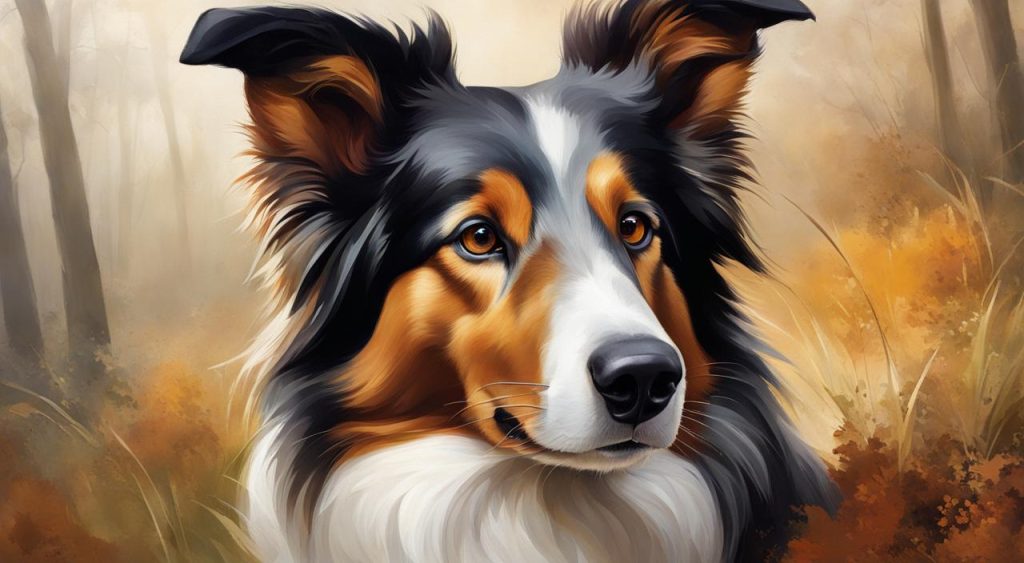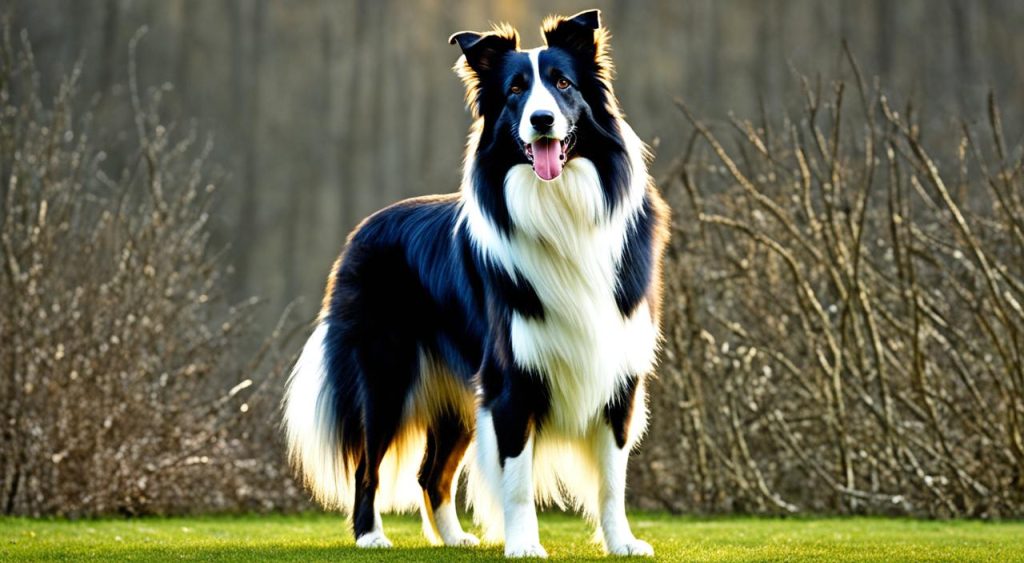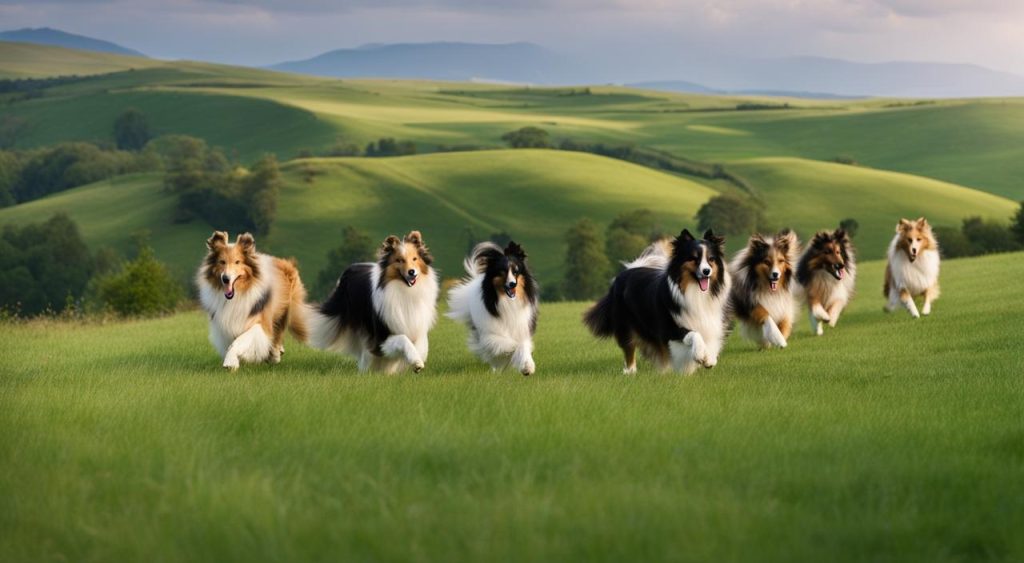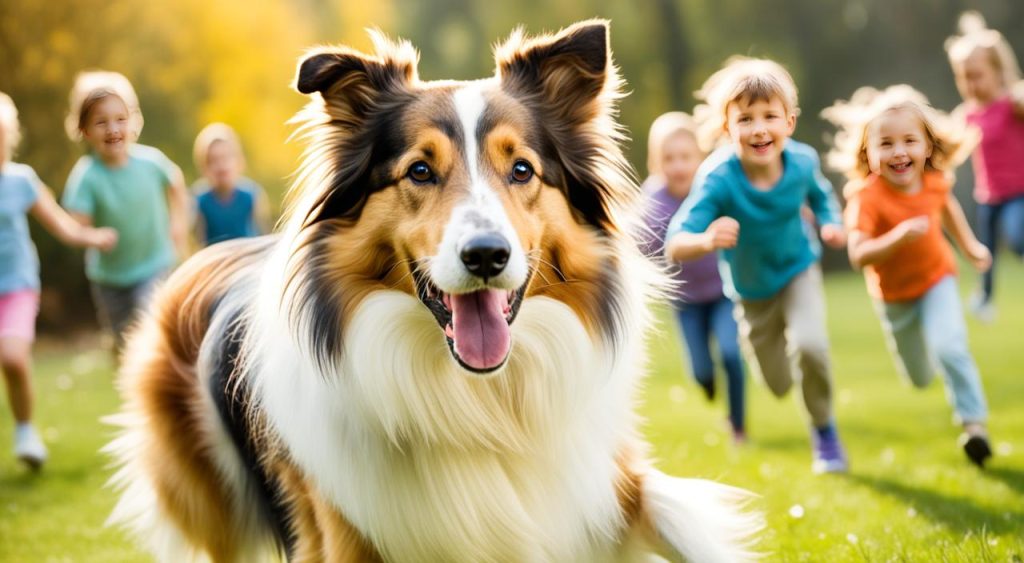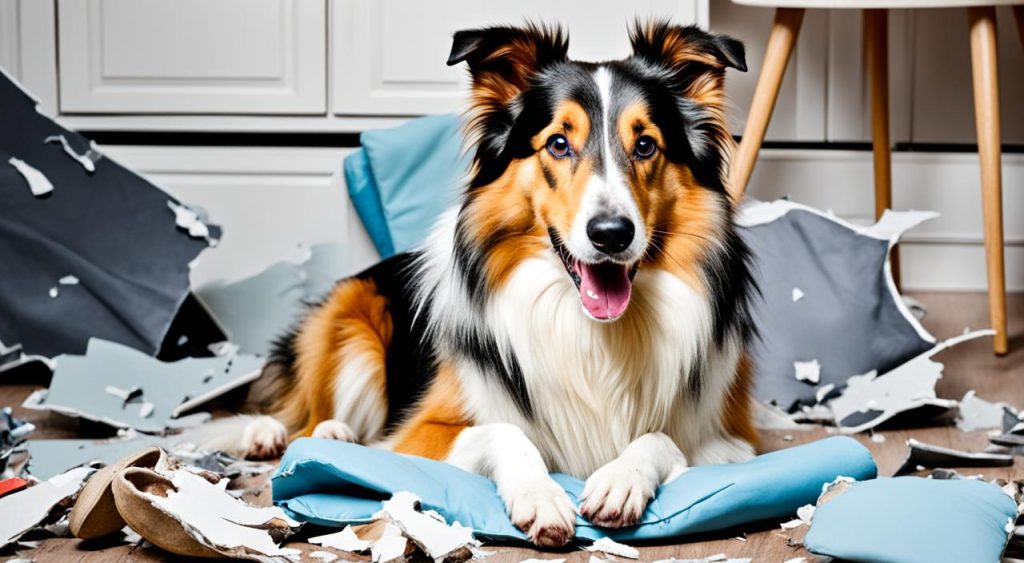If you’re a proud owner of a collie dog, you may have wondered: do collie dogs smell? Collies, like any other breed, have their own unique scent, but it doesn’t have to be overpowering or unpleasant. Understanding the reasons behind collie dog odor and implementing proper care can help manage and reduce their natural scent effectively.
Key Takeaways:
- Collies can have a distinctive odor due to their active lifestyle and tendency to get dirty quickly.
- Understanding the sources of collie odor is crucial for addressing the issue effectively.
- Proper care, such as trimming smelly feet, managing bad breath, addressing ear odor, and keeping their coats clean, can help minimize collie dog scent.
- Implementing regular hygiene practices and seeking veterinary assistance when needed are essential for preventing and managing collie odor.
- Collies are not inherently more smelly than other breeds, and their occasional odor can be managed with the right approach.
Understanding Collie Odor
Collies are generally considered a hygienic breed, but they can develop a doggy odor if not properly cared for. The scent can be attributed to various factors, including dirt on their coats, smelly feet, bad breath, and underlying infections. Understanding the sources of collie odor is crucial for addressing the issue effectively.
Collie dog odor can arise from a variety of reasons. Firstly, their coats can attract dirt and debris, which can contribute to an unpleasant smell. Additionally, collies may develop smelly feet, often due to sweat glands. If not properly maintained, this can lead to a strong odor. Bad breath can also be a factor, especially if dental hygiene is not prioritized. Lastly, underlying infections, such as those in the ears or skin, can contribute to collie odor as well.
To effectively manage and reduce collie dog odor, it is important to address each potential source. Regular grooming and bathing can help keep their coat clean and minimize dirt accumulation. Trim the hair around their paws to reduce foot odor, and consider using gentle shampoos designed to combat odor. Maintaining good dental hygiene through regular brushing and appropriate dental care products can help improve breath. In case of infections or persistent odor, it is recommended to consult a veterinarian for proper treatment.
Proper care, hygiene, and attention to potential odor sources can go a long way in minimizing collie dog odor. By understanding the various factors that contribute to their scent, you can take proactive measures to keep your collie smelling fresh and clean.
Smelly Feet in Collies
Collies are known for their beautiful coats and active lifestyle, but their paws can sometimes develop an unpleasant odor. This smell is often more pronounced between their toes, where there is more hair and sweat glands. To keep your collie’s feet smelling fresh, proper care and hygiene are essential.
Start by regularly trimming the hair between your collie’s toes. Excess hair can trap dirt and moisture, contributing to the odor. Be careful while trimming to avoid any accidents and keep your collie comfortable.
Next, wash your collie’s paws with a mild shampoo. Use lukewarm water and ensure that you clean between the toes thoroughly. Gently massage the shampoo into the fur to remove any dirt or debris. Rinse the paws well to remove all traces of shampoo.
After washing, make sure to dry your collie’s paws completely. Moisture can encourage bacterial growth and contribute to the smell. Use a clean towel to gently pat dry the paws, paying extra attention to the spaces between the toes.
In addition to regular grooming, you can also use balms or olive oil to help minimize foot odor in collies. These products can moisturize and soothe your collie’s paws, reducing any dryness or irritation that may contribute to the smell. Apply a small amount to the paws, focusing on the areas between the toes.
By following these steps and maintaining good paw hygiene, you can help prevent and reduce foot odor in your collie. Remember, keeping your collie’s feet clean and fresh is essential for their overall comfort and well-being.
Managing Collie Bad Breath
Collies, like all dogs, can develop bad breath that can be quite unpleasant. The primary causes of collie bad breath include tooth decay, plaque build-up, and gum disease. Fortunately, there are effective ways to manage and prevent collie bad breath, ensuring your furry friend stays fresh and odor-free.
Regular brushing is essential for maintaining your collie’s dental hygiene. Use a dog-specific toothpaste and brush their teeth at least two to three times a week. This helps remove plaque and food debris that can contribute to bad breath.
Proper dental care plays a significant role in reducing collie dog odor, preventing collie dog scent, and maintaining a healthy mouth.
Incorporating dental chews and appropriate treats into your collie’s routine can also help reduce bad breath. These products are designed to promote dental health by reducing plaque and tartar buildup while freshening their breath.
In addition to dental care, feeding your collie a balanced diet is crucial for oral health. High-quality dog food that meets their nutritional needs supports strong teeth and gums, reducing the risk of dental issues that can cause bad breath.
By implementing these practices, you can effectively manage collie bad breath and prevent unpleasant odors. Emphasizing regular dental care, incorporating dental chews and appropriate treats, and providing a balanced diet will help keep your collie’s breath fresh and their overall well-being in check.
Addressing Ear Odor in Collies
Collies with long hair around their ears may occasionally develop an unpleasant odor. This can be attributed to various factors, such as lack of proper ventilation, yeast infections, bacterial infections, or allergies. To address ear odor in collies and ensure their overall well-being, it’s important to take certain steps.
Firstly, trimming excess hair around the ears can help improve airflow and minimize the risk of odor-causing issues. However, it’s crucial to seek veterinary advice before attempting any grooming procedures to avoid accidental injury or discomfort to your collie.
In addition to regular grooming, maintaining proper ear hygiene is essential. Start by regularly checking your collie’s ears for any visible signs of infection, discharge, or inflammation. If you notice any abnormalities, it’s crucial to consult a veterinarian for a thorough examination and appropriate treatment.
When cleaning your collie’s ears, remember to use a veterinary-approved ear cleaner specifically designed for dogs. Avoid using any harsh or irritating substances that could further aggravate the ear canal. Gently apply the ear cleaner as directed by the product’s instructions to remove excess wax and debris that may contribute to the odor.
Here are some general tips for cleaning your collie’s ears:
- Gently hold your collie’s head steady and lift the ear flap to expose the ear canal.
- Apply a few drops of the ear cleaner into the ear canal, being careful not to insert the applicator tip too deeply.
- Gently massage the base of the ear to help distribute the cleaner and loosen any debris.
- Allow your collie to shake their head to help remove the loosened debris and excess cleaner.
- Finally, use a clean, dry cotton ball or pad to gently wipe away any remaining debris from the outer ear.
It’s important to note that excessive cleaning or improper techniques can also lead to ear problems in collies. Therefore, it’s advisable to consult with a veterinarian for guidance on the frequency and method of ear cleaning that suits your collie’s specific needs.
By following these ear hygiene practices and addressing any underlying issues promptly, you can effectively manage and prevent ear odor in your collie, ensuring their optimal health and well-being.
Dealing with Dirty Coats in Collies
Collies are known for their active nature and love for outdoor activities, which can often lead to dirty coats. Keeping your collie’s coat clean is essential not only for their appearance but also for reducing collie dog odor. Regular brushing and grooming will help remove dirt and debris that can accumulate in their fur, ensuring a clean and fresh-smelling coat.
When grooming your collie, choose appropriate shampoos and conditioners specifically formulated for dogs. These products are designed to cleanse the coat effectively without stripping away the natural oils that keep their fur healthy. It is important to thoroughly rinse out all the shampoo and conditioner to prevent any residue that could contribute to collie dog scent.
After bathing, make sure to dry your collie’s coat thoroughly. Moisture trapped in the fur can create a breeding ground for bacteria and unpleasant odors. Use a towel or a hairdryer on a low setting to remove excess moisture from their coat. Pay extra attention to the areas where moisture tends to get trapped, such as under the armpits and around the ears.
“Regular grooming is key to maintaining a clean and fresh-smelling coat for your collie.”
Additionally, consider adding a regular grooming routine to your collie’s care regimen. Brushing their coat every few days helps remove loose fur, tangles, and debris, preventing them from becoming trapped and causing odor. It also helps distribute the natural oils produced by their skin, improving the overall health and appearance of their coat.
By taking these steps to keep your collie’s coat clean, you can effectively reduce collie dog odor and prevent it from becoming an issue. Best of all, your collie will not only look great but also feel more comfortable and smell fresher.
Tips for Keeping Collies Smelling Nice
Keeping your collie smelling fresh is essential for both your enjoyment and your pet’s well-being. Here are some expert tips to help you manage and reduce collie dog odor:
1. Use Doggy Deodorant Sprays in Moderation
To temporarily mask any unpleasant odors, you can consider using doggy deodorant sprays. However, it’s important to use these products in moderation to avoid irritating your collie’s sensitive skin. Only choose sprays specifically designed for dogs and follow the instructions provided.
2. Ensure a Balanced Diet
A proper diet plays a crucial role in your collie’s overall health, which can directly impact their natural scent. Ensure that your pet receives a balanced diet consisting of high-quality dog food that meets their nutritional needs. Consult with your veterinarian for dietary recommendations specific to your collie’s age, size, and any existing health conditions.
3. Bathe Occasionally Without Stripping Natural Oils
Occasional baths can help keep your collie smelling fresh and clean. However, it’s important to be mindful of not overwashing, as this can strip their coat of its natural oils, leading to dry skin and potentially aggravating any existing odor issues. Use a mild, dog-specific shampoo and rinse thoroughly. Follow with a conditioner if needed.
4. Regular Brushing to Distribute Oils
Brushing your collie’s coat regularly not only helps to remove loose hair and prevent matting but also distributes the natural oils produced by their skin. This can contribute to a healthier coat and reduce unpleasant odors. Use a slicker brush or a brush suited for collies to effectively groom their medium-to-long fur.
5. Maintain Good Dental Hygiene
Bad breath can contribute to overall collie odor. Establishing a regular dental care routine for your collie is essential. This includes brushing their teeth using dog-specific toothpaste, offering dental chews or appropriate treats, and scheduling professional dental cleanings with your veterinarian as needed.
By following these tips, you can effectively manage and reduce collie dog odor, ensuring that your furry friend smells fresh and pleasant. Remember, maintaining proper hygiene practices, a balanced diet, and regular grooming will contribute to keeping your collie smelling nice.
Are Collies a Particularly Smelly Breed?
Contrary to popular belief, collies are not inherently more smelly than other dog breeds. Their occasional odor is primarily influenced by their environment, levels of physical activity, and proper care. Understanding that collies’ odor can be managed and prevented with regular hygiene practices is important for dispelling misconceptions.
Collies are known for their active lifestyle, which can sometimes lead to them getting dirty more quickly than other breeds. This, combined with their thick double coat, may contribute to a distinct collie dog odor. However, with the right approach, reducing collie dog odor and preventing collie dog scent is achievable.
Regular grooming and brushing play a crucial role in maintaining a clean and fresh-smelling coat for collies. By brushing their coat frequently, you can help distribute natural oils and prevent any build-up of dirt or unpleasant smells.
In addition to regular grooming, proper hygiene practices are essential in addressing collie dog odor. This includes keeping their paws clean to prevent smelly feet, maintaining dental hygiene to combat bad breath, and addressing any ear infections that may contribute to collie dog scent.
It’s important to note that collie odor is not a characteristic unique to the breed itself. Like any other dog, collies can develop unpleasant scents if not given the proper care and attention. However, with proper hygiene practices and regular grooming, you can effectively manage and minimize collie dog odor.
Common Causes of Collie Odor
Collie dogs can sometimes emit an unpleasant odor, and understanding the common causes behind this odor is essential for effectively addressing and preventing it. Some of the common reasons for collie odor include:
- Rolling in unpleasant substances: Collies have a natural instinct to roll in things like dirt, mud, and even animal feces. This behavior can leave them with a strong and unpleasant smell.
- Smelly feet: Collies have sweat glands in their paws, which can lead to an odor. The hair between their toes can trap moisture and bacteria, intensifying the smell.
- Bad breath: Dental issues such as tooth decay, plaque buildup, and gum disease can cause collies to have bad breath, resulting in an unpleasant odor.
- Dirty coats: Collies’ active nature and love for outdoor activities can lead to dirty coats. This accumulated dirt, debris, and oils can contribute to their overall odor.
- Ear infections: Due to their long hair around the ears, collies are prone to ear infections. These infections can produce a distinct smell that adds to their overall odor.
- Dry skin: Collies with dry skin may experience flakiness and itchiness, which can contribute to their odor.
- Impacted anal glands: Collies have anal glands that can produce a strong odor if they become impacted or infected.
Recognizing these common causes allows for targeted solutions to effectively address and prevent collie odor.
Best Practices for Odor Prevention in Collies
To keep your collie smelling fresh and minimize any unpleasant odors, it is important to implement the following best practices:
1. Regular Inspections
Perform regular inspections of your collie’s body to identify any potential sources of odor. Check for dirt or debris in their coat, examine their paws for any signs of odor or infection, and inspect their ears for redness, discharge, or foul smell.
2. Brushing
Regular brushing helps remove loose hair, dirt, and debris from your collie’s coat, reducing the chances of a lingering odor. Brushing also helps distribute natural oils, keeping their fur healthy and less prone to developing an unpleasant scent.
3. Washing Paws After Walks
After outdoor walks, it is essential to wash your collie’s paws to remove any dirt, bacteria, or potential allergens that may contribute to odor. Use a mild pet-safe shampoo and dry their paws thoroughly to prevent moisture buildup.
4. Maintaining Dental Hygiene
Regular dental care is crucial in preventing bad breath, a common source of doggy odor. Brush your collie’s teeth with dog-friendly toothpaste, provide appropriate dental chews or treats, and schedule regular veterinary dental check-ups.
5. Addressing Ear Infections
Certain collie breeds may be more prone to ear infections, which can contribute to unpleasant odors. Regularly check your collie’s ears for signs of infection or irritation and seek veterinary assistance if necessary. Follow any recommended cleaning protocols provided by your veterinarian.
6. Keeping Coats Clean
Regular bathing with a gentle dog shampoo helps keep your collie’s coat clean and fresh. Avoid over-bathing, as it can strip the natural oils and lead to dry skin, which may exacerbate odors. It is also important to thoroughly dry their coat after each bath.
7. Seeking Veterinary Assistance When Needed
If you notice persistent or unusual odors despite practicing proper hygiene, or if your collie shows additional symptoms like excessive itching or discomfort, it is essential to consult a veterinarian. They can help diagnose any underlying health issues that may be contributing to the odor and provide appropriate treatment.
By implementing these best practices, you can effectively prevent and manage collie odor, ensuring that your furry companion remains fresh-smelling and comfortable.
When to Consult a Veterinarian
If collie dog odor persists despite proper hygiene practices or if there are additional symptoms such as excessive itching, discomfort, or changes in behavior, it is crucial to consult a veterinarian. They can help diagnose any underlying health issues and provide appropriate treatment.
A professional veterinarian has the expertise to identify the root cause of collie dog scent problems and offer tailored solutions. They will conduct a thorough examination, considering collie breed smell characteristics, and may run tests to determine if there are any underlying medical conditions contributing to the persistent odor.
Remember, reducing collie dog odor goes beyond regular grooming and hygiene practices. Seeking veterinary assistance is especially important if your collie dog scent becomes increasingly strong or if there are any accompanying signs of illness.
An image of a beautiful collie dog. Collie dogs can develop distinct odors due to various factors, and consulting a veterinarian is essential for addressing persistent scent issues.
Conclusion
Collies, while known for their distinctive odor, are generally considered a hygienic breed. By implementing regular grooming practices, maintaining proper hygiene, and providing attentive care, you can effectively manage and minimize collie dog odor. Understanding the characteristics of collie breed smell and addressing the specific factors that contribute to it can help you keep your collie smelling fresh and pleasant.
Regular brushing, particularly paying attention to sensitive areas such as paws and ears, can go a long way in reducing collie dog odor. Proper dental care, including regular brushing and incorporating dental chews, helps prevent bad breath. Maintaining clean coats through proper washing and drying techniques is also essential.
In addition to these measures, monitoring and managing any underlying health issues such as ear infections or impacted anal glands can further contribute to reducing collie dog odor. By following these tips and maintaining a consistent hygiene routine, you can ensure that your collie remains a clean and enjoyable companion.

